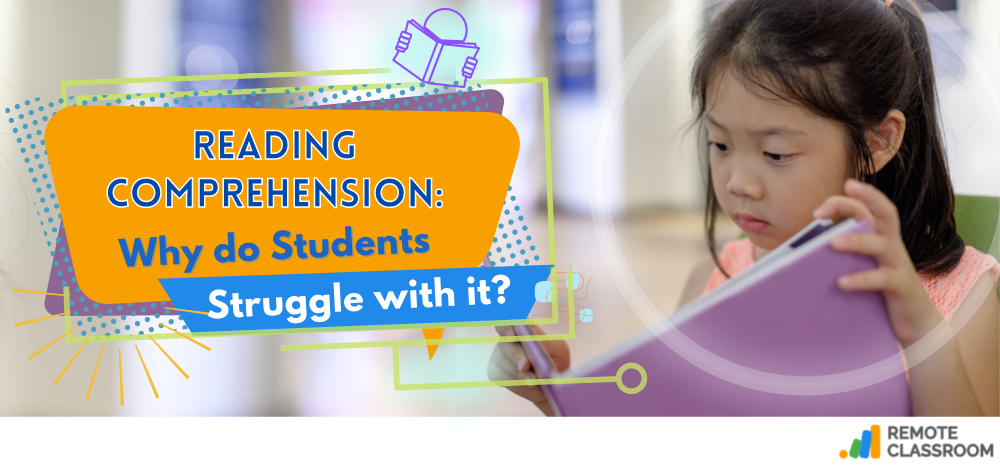Reading comprehension is the ability to mentally digest written words and derive their meaning by combining new information with previous knowledge. Reading comprehension isn’t just about being able to read words on a page correctly; it’s also about comprehending the meaning of the text.

Asian child working hard on his homework at home. Credit: anurakpong on iStock.
Many children have trouble with reading comprehension, which can cause a youngster to be stressed out in all of their classes. Students who struggle with reading comprehension often lag significantly behind their peers academically in a variety of ways because every academic topic requires some type of reading.
Why do some pupils struggle to comprehend what they are reading?
There are several reasons why a youngster may struggle to comprehend what they read:
Learning disability. A learning handicap, such as dyslexia, or vision, hearing, or speech impairments, can create reading comprehension issues.
ADHD (Hyperactivity/Attention Deficit). The disorder might make it difficult for a child to concentrate. As a result, he may be less interested in comprehending what he’s reading.
Phonological awareness. Reading comprehension problems might arise when it is difficult to sound out the words on a page. A youngster who takes twice as long to read a page’s words will spend less processing time trying to figure out what they mean, resulting in worse comprehension of the content.
Lack of vocabulary. A lack of grade-level vocabulary might also obstruct comprehension if the youngster does not grasp the bulk of the words he is reading.
Lack of interest. Sometimes it’s just a case of a lack of excitement. A youngster will be unmotivated to study if she is uninterested in the information she is reading.
Stress or anxiety. Reading comprehension problems can lead to stress or anxiety about schoolwork, which can lead to even more difficulties with reading comprehension.
Signs that your child is struggling with reading comprehension:
Parents may be unaware of the reasons for their child’s reading comprehension difficulties. An undetected learning disability or a child’s stress that the parent is unaware of could be the underlying cause.

An Asian girl struggling to read a book. Credit: Tomwang112 on iStock.
Here are some warning signs that your child may need help with reading comprehension:
- Your child is unable to provide a summary of the reading and may concentrate on only one aspect of the story.
- They won’t be able to explain what a character was thinking or feeling.
- Your child does not make the connection between events in a story and real-life events.
- They may be able to tell you what happened in the story, but he or she will not be able to explain why those events occurred.
What can you do to help students who are having trouble understanding what they’re reading?
You should ask your child about what she is reading regularly to help her improve her reading comprehension skills.
Pose probing questions like:
- “Can you tell me how that character felt?”
- “What makes you believe that?”
- “What can we take away from this story?”
- “This is a story about a bus ride.”
- “Can you tell me about a time when you rode a bus?”

A little girl using a laptop to study. Credit: jamesteohart on iStock.
Always ask your child to refer to the text for their answers and to point out their evidence when asking probing questions. Teach your child to ask herself what she’s reading all of the time, and to take brain breaks if she needs more time to process a section of the story before moving on. It’s also crucial to go over any vocabulary words that your child may not be familiar with.
With these simple exercises, you can help your child improve her reading comprehension. The most important thing is to stick to these habits and maintain a positive attitude to show your child that learning is a rewarding endeavor.

Asian kindergarten school girl video conference e-learning with teacher on laptop in living room at home. Credit: anurakpong on iStock.
Reading difficulties are a common problem. Approximately one in every five people (including children) has some difficulty with reading. It can also cause problems in other areas of learning, such as writing, spelling, fluency, and comprehension because it is such an important skill. These obstacles make it difficult for students to do well in school and often lead to low self-esteem.
What Are the Causes of Reading Comprehension Issues?
Lack Of Support
Different children have different support needs. Support includes the availability of reading materials, one-on-one support from educators, and additional learning accommodations.

School students fall asleep while reading a book. Credit: Chinnapong on iStock.
Without access to these resources, children who require additional help begin to fall behind and are unable to catch up, putting them at a major learning disadvantage.
Attention Disorder
Children who have difficulty with attention often have difficulty with reading comprehension. Students with an attention disorder (such as Attention Deficit-Hyperactivity Disorder) have trouble focusing on the material and frequently become distracted, leading to poor comprehension.
Difference In Learning Styles
There isn’t a ‘one size fits all learning solution—every student has a slightly different learning style that works best for him or her. Many children prefer one of the four main learning styles: Visual Learning, Auditory Learning, Kinesthetic/Tactile Learning, and Read/Write Learning.

An Asian kid reading a book. Credit: szeyuen on iStock.
When a student isn’t able to learn according to his or her learning style, it makes it difficult to build core skills—including reading.
Learning Disabilities
If your child is struggling to read, it may be an indication of an underlying learning disability. Reading disabilities are more common than many people think—between 15-20% of people (including children) struggle with some level of dyslexia. If your child isn’t performing as expected, avoids reading, and is stressed about learning, he or she may be struggling with a reading disability.
My Child Struggles With Reading—What Can I Do To Help?
Examine a Variety of Reading Materials.
Traditional books can be intimidating to a child who struggles to read. Use a variety of formats to cater to your child’s interests, such as graphic novels, comics, recipe books, magazines, and audiobooks.

A student having an online class. Credit: ThitareeSarmkasat on iStock.
This is also an excellent opportunity to tailor reading to your child’s preferred learning style so that he or she can gain confidence in their abilities.
Motivate And Reward Success.
Children who have difficulty reading often lack self-assurance. Be patient, celebrate small victories, and encourage your child to keep going—especially when he or she is frustrated or stressed. If your child knows he or she has your full support, he or she will be more motivated to keep trying.
Improve your active listening abilities.
The ability to read is greatly influenced by one’s ability to listen. Good listening skills aid in the development of phonetics and fluency, both of which are important in the development of reading skills.
Play audiobooks, age-appropriate podcasts, or read aloud to your child to improve their listening skills. To encourage deeper thought about the topic and better comprehension, ask your child questions about what he or she heard.
Read Aloud.
To improve phonetics and fluency, encourage your child to read aloud. Avoid books that are too difficult or challenging when practicing.

A little girl reading a book at home. Credit: Pornpak Khunatorn on iStock.
To strengthen skills and raise confidence, choose items that are appropriate for your child’s current reading level (or just slightly above it).
Consider Tutoring.
A reading tutor can be an excellent addition to your child’s educational plan. It’s a great way to boost your child’s self-esteem, improve comprehension, and get them ready for school.
If your child is having trouble reading, take action.
If you feel your child is struggling with reading, don’t wait to see if he or she improves on his or her own—catch-up can be even more difficult. The suggestions above are the beginning stages in assisting your child in improving his or her reading abilities so that he or she can succeed.
Good readers are phonemically aware, comprehend the alphabetic principle, apply these skills quickly and smoothly, have large vocabularies, syntactic and grammatical skills, and can relate what they read to their own experiences.
Reading Comprehension Tips. Video from Youtube.
Takeaway
Reading development can be hampered by difficulties in any of these areas. Furthermore, children begin learning to read long before they start formal schooling. Children who are exposed to exciting literacy experiences from birth have an advantage in terms of vocabulary development, comprehension of reading goals, and acquiring knowledge of print and literacy ideas.

A child reading a book. Credit: globalmoments on iStock.
Reading comprehension disorder affects both children and adults, and it does not make them any less intelligent than their peers. People who struggle with comprehension have general learning abilities that are on par with, if not better than, those who do not have learning disabilities. They only have a problem in this one area.
In this new educational framework, Remote Classroom is a tracking tool that allows parents to keep track of their children’s development. Educators can, of course, use it to keep track of their students’ assignments and events.
#remoteclassroomph
#remoteclassroom
#remotelearning
#remoteeducation
#remoteschools
#onlineteachers
#onlinetutoring
#virtuallearning
#lifeschooling
#intentionalschooling
#virtualclass
#onlinelearning
#homeschooling
#virtuallearning
#onlineschools

